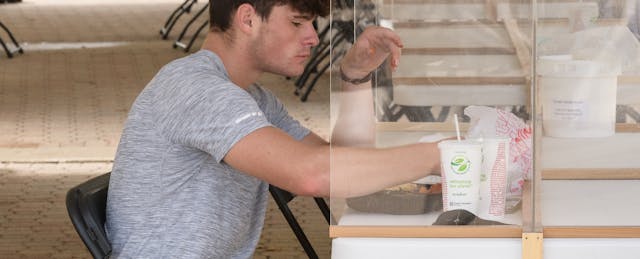In normal times, a signature feature of college life is parties—often immortalized in so many Hollywood films where students let loose, meet others and find out who they are. But this fall, as colleges try to stay open during the COVID-19 pandemic, those very parties may be the biggest threat to keeping education going.
So, what’s left of campus life for students to enjoy at a time of social isolation? And how are professors coping?
This week we continue our semester-long series taking you inside college life during the pandemic. We’re hearing intimate reports and reflections from professors and students on six campuses, following their ups and downs as they try to keep education on track during a global health crisis.
Parties are indeed happening on plenty of college campuses, and clusters of COVID-19 outbreaks have already forced some universities to send students home and put all their classes back online. An analysis by The New York Times counted more than 88,000 cases and 60 deaths on campuses nationwide, and even though some campuses have become hotspots, others are managing to keep the virus in check and remain open. In fact, the majority of campuses that reopened are still open—at least for now.
But getting the balance right between safety and openness is a continuous challenge.
It turns out that traditional-age college students may be wired to be particularly bad at following social-distancing guidelines, Deb Nichols, a Purdue professor who studies human development, knows from her scholarship that campuses have plenty to worry about.
“Developmentally speaking, adolescents and young adults through about age 25, their prefrontal cortex is not fully formed,” she said. “Your prefrontal cortex is responsible for impulse control and decision-making and higher-order thinking.” And that’s partly why people in that age group are more likely to engage in risky behavior and do impulsive things.
Whenever she talks with parents, Nichols added, “I always say that … adolescents are kind of like grownup toddlers. They push boundaries and try on different identities and do dumb things and make mistakes. And that’s what they’re supposed to do. It’s just now you have this pandemic that can mean the consequences are much more severe.”
But not all students are partying. Sabine Brunswicker, another Purdue University professor, says she sees two kinds of students. One group thanks her for enforcing mask rules in the classroom and appears more careful than even some professors. But other students appear “annoyed” by the rules and seem to disregard them.
And it’s not just about partying. The absence of informal social interactions on campus is a real loss.
“The things that I remember most about my first-year experience in college really had nothing to do with academics,” says David Pena Guzman, a professor at San Francisco State University, who is now teaching remotely from Paris since instruction went online only. “The things that I remember were meeting people from very different walks of life, having that almost cliche experience of being exposed to people whose backgrounds I knew nothing about and who changed my perspective on the world. … I feel a little bit sad for students who are beginning their college right now because it doesn’t matter how hard we try. It doesn’t matter how excellent our online teaching is. It won’t replace that sort of life changing experience that is going off to college.”
At Purdue University, officials have set up more than 30 pavilion tents where there's plexiglass barriers around nearly every seat.
"I joked that it looked a bit like prison where you, you speak with your relatives [through glass]," said Joseph Ching, a junior at Purdue who uses the tents for most of his meals. "It's definitely difficult to hear friends on the other side sometimes... and we're thinking about maybe just we would call each other" while we're sitting together in person.
One of the students who is keenly feeling the loss of the college social experience is Marjorie Blen, a first-generation college student who just transferred to San Francisco State from a local community college. This was going to be her first year on a four-year campus.
“I feel really robbed of that experience,” she said. “We still need that social component of being in the institution, physically, with the teachers and the students and the groups and the events and everything that makes college worth going and paying for.”
Hear more on the full episode of this week's podcast. Listen to this week’s episode on Apple Podcasts, Overcast, Spotify, Stitcher, Google Play Music, or wherever you listen to podcasts, or use the player on this page.
This is part three of a seven-part podcast series. Check out episode 1 and episode 2 as well, and look for the next installment on Oct 6 on the EdSurge Podcast feed.


